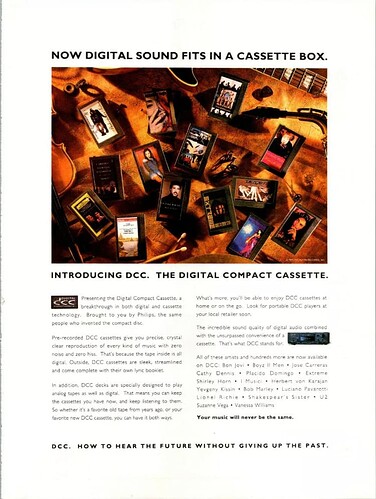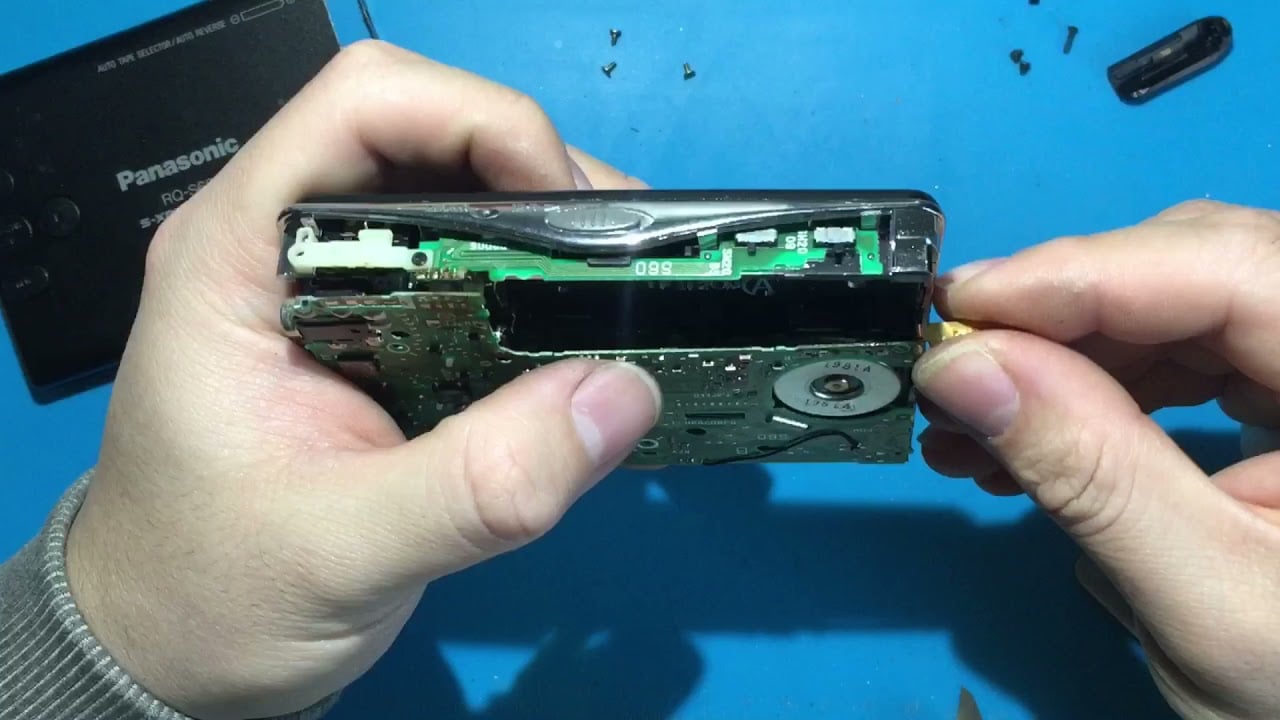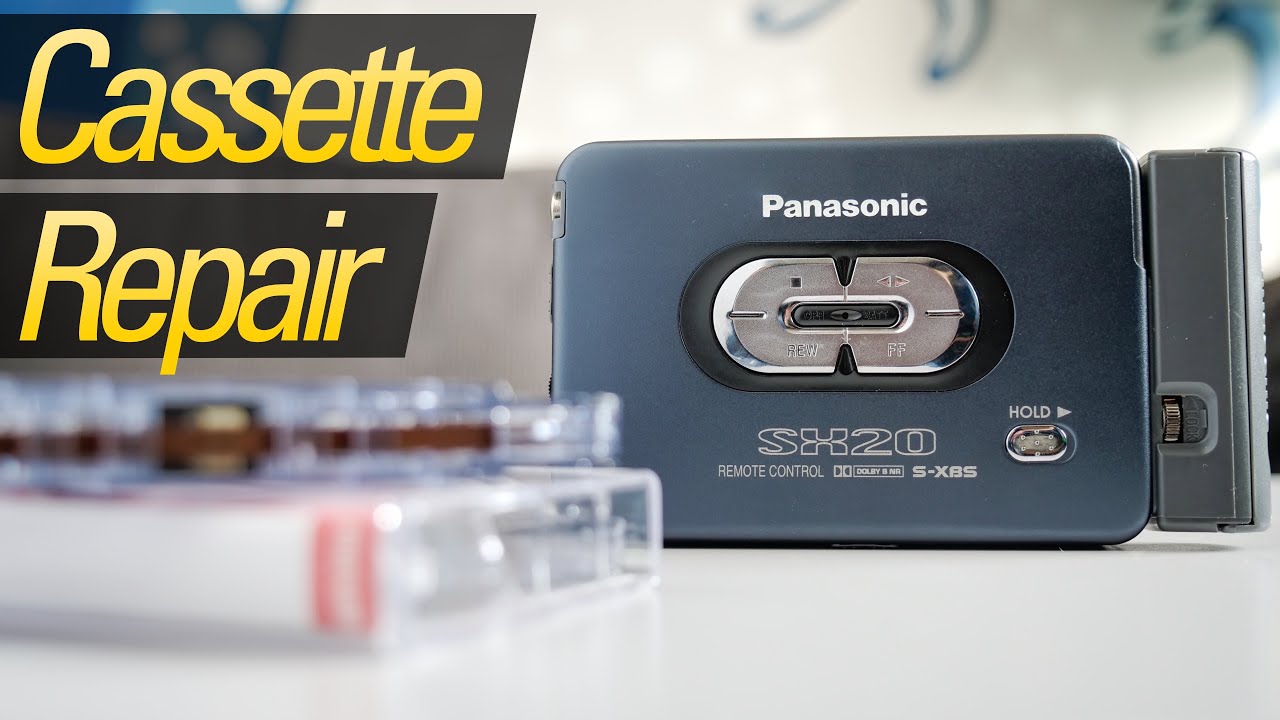I don’t remember how or when I first heard about it.
I’m pretty sure when I first heard about a cassette that could be recorded digitally and a recorder that could also use analog cassettes, I thought it was a great idea. I already had a CD player (and I had made sure it had a digital output in case I would ever own some sort of digital audio recording device) and I was buying a lot of music at the time (end of the 1980s, beginning of the 1990s) and recording music from the radio.
I went to the Firato electronics show in Amsterdam in 1992 just like I did every 2 years, and was very impressed with DCC (and MiniDisc too by the way but as a Philips fan I preferred DCC). I know I saw a DCC recorder with a sideways drawer at the time, and I remember it was a German brand. Now I know this must have been the Grundig DCC380 which was under development at Philips in Hasselt (where I would work for a while in 1996 but that’s a different story).
Around that time, in 1992, I was studying Computer Science and I moved out of my parents’ house near Eindhoven, to a student house in Eindhoven (home town of Philips, where my dad worked at the time). I would have liked to have a DCC recorder but there was no way I would be able to afford it. But that was okay: The first DCC recorder was a 900 series anyway and I always found the 900 series ugly. Also from what I heard, it was missing some features like title recording. So like many others, I decided it could wait. I had a nice quality analog stereo system, top-of-the-line Philips (made by Marantz) 1987.
I remember (in what must have been 1993) Philips came out with the DCC recorders that had their drawers sideways, and I hung around the “V&D” store drooling at them. Those looked so much better than the DCC900! But I was still studying and had no money. And they still hadn’t fixed the problem that you could buy tapes with titles (I was totally not interested in buying prerecorded tapes at all whatsoever) but you couldn’t record your own titles on tape. It could wait.
In 1993 I graduated but it took me a while to get my first job at Codim, a small company that made CD-i productions. Now I could finally afford to buy an actual S-VHS VCR, an actual TV and a DCC recorder. This was the beginning of 1995. I got the DCC730 because I thought it was a beautiful machine and it finally had the title editing features. I didn’t care that it was an 18 bit machine; CD’s were 16 bits anyway.
In November 1995, I had just moved out of my student home to an apartment. My friends and I visited all computer fairs around the country a few times a year, and one of those was the “HCC Dagen” in Utrecht. The first thing I saw was a big Philips truck just past the ticket booth. I went in because I was a Philips fan, and I saw the DCC-175 with DCC-Studio. Editing DCC’s with a computer! That was AWESOME! They sold them at the truck but at first, I left without buying one because it was quite expensive: my DCC730 had been something like 400 guilders ($200?) and the DCC175 with PC-cable was 900 guilders. Ouch! I didn’t really have that kind of money.
But I walked around the fair for a while and decided if I was going to get off the train near my house and feel bad about a decision, it was going to be because I wouldn’t have bought it, not because I wouldn’t have money. So I went back to the truck and bought one. I still walked around the fair for the rest of the day but I don’t think I bought anything else.
At the time, (1995/1996) I had been a member of the DCC-L email discussion list for a while, and there were some Philips people on there that were saying things like PASC is almost the same as MP1. Eventually with the help of someone at Philips whose name I forgot, I wrote the “DCCConv” program to convert an MPP file to MP1. So now I could convert DCC-Studio files to MP1 which many audio players could play. Unfortunately, DCC-L no longer exists and the Wayback Machine doesn’t have any archives of it. Also I didn’t have any websites back then so the DCCConv program was hosted by someone else who got tired of it and took his site down and my program with it.
In 1996, two weeks before Philips announced the demise of DCC, I wrote the DCC-FAQ page which is still online today, at dcc-faq.org. I kept it online even after I emigrated to the USA in 2000. It became more or less the de-facto main source for information about DCC because there wasn’t anything else anymore. Later on, Jonathan “John-John” Dupré, a French guy, put another website online and some Youtube videos, but that was all.
At the end of the 1990s, also thanks to my job at Codim where they used CD-R way before it was available to consumers, I got heavily into recordable CD and recordable DVD. I became a beta tester for Plextor and ended up with a lot of CD recorders and DVD recorders. DCC got pushed to the background a little, and when I bought a new stereo system in 1997 or so (a Marantz Slimline – very beautiful but actually not as good in sound quality as my 1987 system), I got a Minidisc recorder too.
I didn’t take my 730 when I emigrated; I had left it behind with my dad who eventually moved to Spain with his wife and took it with him and stored it for many years. I didn’t take my Marantz Slimline either and my dad sold it to his ex-neighbor (with my permission) so I could use the money to pay off some student debt.
But I had taken my DCC-175 and PC-cable with me when I emigrated. In my suitcase, because it was one of the rarest things I own. Over the years I used it every once in a while to play my DCC’s and cassettes, but eventually it stopped working for no obvious reason (turned out it was the belt, of course). So I kinda lost interest in DCC.
In 2014 due to circumstances I got in a nostalgic mood and I bought a DCC600 and an Optimus DCT2000 from eBay. The 600 was kinda iffy and the DCT2000 didn’t arrive at all at first, and eventually did arrive but had been smashed to death by the post office, thanks to some crappy packaging. I digitized all my old tapes and also played a bunch of analog cassettes because I didn’t have any other way to do that at the time. That was fun but I put those away again too.
In 2015 my dad moved back to the Netherlands and had to downsize, so he couldn’t store my stuff anymore. He sent me my DCC730 and a preproduction Philips CD100 that I once got as a present from a colleague (but that’s another story). I had to buy a step-up transformer to provide power, but everything still worked, even though I didn’t even bother to put the transport protection screws in the CD100.
Shortly after that, I moved from Arizona to Southern California and I got this Facebook message one day from this guy called Ralf who was into DCC and had heard that I knew a few things about it. My answer was that I would be happy to help, and I actually lived not too far away. We met, and the rest, as they say, is history 
I’ve bought a number of DCC recorders to add to my collection, but I don’t have any recorders in my permanent setup. I’m mostly interested in the technology, and the possibility of adding features to DCC recorders that Philips didn’t think were important enough to bother with. When we got the DCC System Specification from a donor a couple of years ago, that was the Holy Grail of information that made it possible to continue with DCC into the future.
At least as long as there are heads and cassettes.
===Jac


